Related Research Articles

Brazzaville is the capital and largest city of the Republic of the Congo. Administratively, it is a department and a commune. Constituting the financial and administrative centre of the country, it is located on the north side of the Congo River, opposite Kinshasa, the capital city of the Democratic Republic of the Congo.
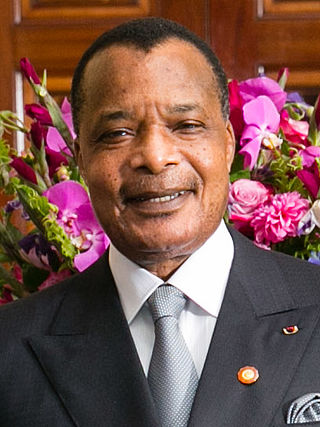
Denis Sassou Nguesso is a Congolese politician and former military officer who became president of the Republic of the Congo in 1997. He served a previous term as president from 1979 to 1992. During his first period as president, he headed the Congolese Party of Labour (PCT) for 12 years. He introduced multiparty politics in 1990, but was stripped of executive powers by the 1991 National Conference, remaining in office as a ceremonial head of state. He stood as a candidate in the 1992 presidential election but placed third.

Congolese music is one of the most influential music forms of the African continent. Since the 1930s, Congolese musicians have had a huge impact on the African musical scene and elsewhere. Many contemporary genres of music, such as Kenyan Benga and Colombian Champeta, have been heavily influenced by Congolese music. In 2021, Congolese rumba joined other living traditions such as Jamaican reggae music and Cuban rumba on UNESCO's "intangible cultural heritage of humanity" list.
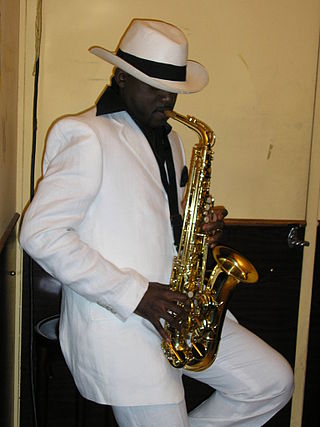
The Republic of the Congo is an African nation with close musical ties to its neighbor, the Democratic Republic of the Congo. The Democratic Republic of the Congo's homegrown pop music, soukous, is popular across the border, and musicians from both countries have fluidly travelled throughout the region playing similarly styled music, including Nino Malapet and Jean Serge Essous. Brazzaville had a major music scene until unrest in the late 1990s, and produced popular bands like Extra Musica and Bantous de la Capitale that played an integral role in the development of soukous and other styles of Congolese popular music. The Hip-Hop group "Bisso na Bisso" also hails from Congo-Brazzaville.
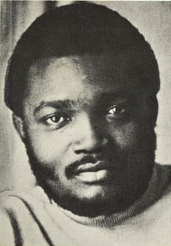
François Luambo Luanzo Makiadi was a Congolese musician. He was a major figure in 20th-century Congolese music, and African music in general, principally as the leader for over 30 years of TPOK Jazz, the most popular and significant African band of its time and arguably of all time. He is referred to as Franco Luambo or simply Franco. Known for his mastery of African Rumba, he was nicknamed by fans and critics "Sorcerer of the Guitar" and the "Grand Maître of Zairean Music", as well as Franco de Mi Amor by female fans. His most known hit, "Mario", sold more than 200,000 copies and was certified gold. In 2023, Rolling Stone ranked him at number 71 on its list of the 250 Greatest Guitarists of All Time.
Marie-Claire Mboyo Moseka, known professionally as M'bilia Bel, is a Congolese singer and songwriter. Dubbed the "Queen of African Rumba" and "Queen Cleopatra", she is regarded as one of the most influential figures in 20th-century Congolese and African popular music. Her music is a blend of traditional Congolese rumba, soukous, rap, and zouk, with lyrics that often delve into themes of love, politics, hedonism, militancy, jealousy, sentimentality, and education.
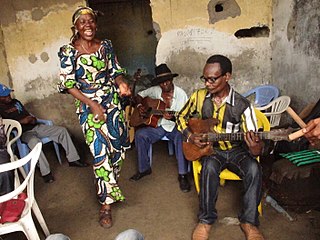
Congolese rumba, also known as African rumba, is a dance music genre originating from the Republic of the Congo and Democratic Republic of the Congo. With its rhythms, melodies, and lyrics, Congolese rumba has gained global recognition and remains an integral part of African music heritage. In December 2021, it was added to the UNESCO list of intangible cultural heritage.

Parliamentary elections were held in the Republic of the Congo on 24 June 2007, with a second round initially planned for 22 July 2007, but then postponed to 5 August 2007. According to the National Commission of the Organization of the Elections (CONEL), 1,807 candidates stood in the first round for 137 seats in the National Assembly. The ruling Congolese Labour Party and parties and independent candidates allied with it won 125 seats, while two opposition parties won a combined 12 seats.
Justin Koumba is a Congolese politician who was President of the National Assembly of Congo-Brazzaville from 2007 to 2017. He was an official at the United Nations and served in the government of Congo-Brazzaville as Minister of National Education in 1992; subsequently, he was President of the National Transitional Council from 1998 to 2002 and President of the National Human Rights Commission from 2003 to 2007.

The Republic of the Congo, also known as Congo-Brazzaville, Congo Republic, or simply Congo, is a country located on the western coast of Central Africa to the west of the Congo River. It is bordered to the west by Gabon, to the northwest by Cameroon, to the northeast by the Central African Republic, to the southeast by the Democratic Republic of the Congo, to the south by the Angolan exclave of Cabinda, and to the southwest by the Atlantic Ocean.
Pierre-Damien Boussoukou-Boumba is a Congolese politician. During the single-party rule of the Congolese Labour Party (PCT), he served in the government of Congo-Brazzaville as Minister of Health from 1979 to 1984, as Minister of Scientific Research from 1984 to 1989, and as Minister of Basic Education from 1989 to 1991. He was Ambassador to the United States in the 1990s and Minister of Small and Medium-Sized Enterprises from 1997 to 2002; subsequently he was a Deputy in the National Assembly of Congo-Brazzaville from 2002 to 2007. Boussoukou-Boumba was also President of the Union for the Defence of Democracy (UDD), a political party, from 1996 to 2011.

Henri Djombo is a Congolese politician who has served in the government of Congo-Brazzaville as Minister of State for Agriculture since 2016. Previously he was Minister of Water and Forests from 1980 to 1985 and Minister of the Forest Economy from 1997 to 2016. He is a member of the ruling Congolese Labour Party (PCT).
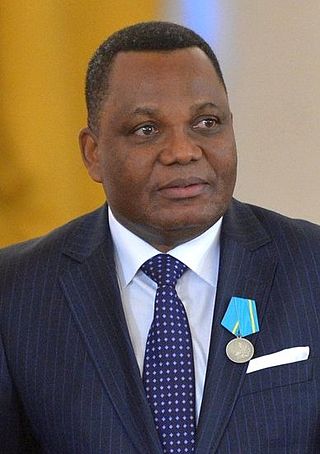
Jean-Claude Gakosso is a Congolese politician who has served in the government of the Republic of the Congo as Minister of Foreign Affairs since 2015. Previously, he was Minister of Culture and the Arts from 2002 to 2015.

Serge Michel Odzoki is a Congolese politician. A member of the Congolese Labour Party (PCT), he is a journalist by profession and worked for years as a diplomat before serving in the government of Congo-Brazzaville as Minister of Sports and Youth from December 2007 to September 2009. He has been a Deputy in the National Assembly since 2009 and Spokesman of the PCT since 2011.

The Ninjas were a militia in the Republic of the Congo, which participated in numerous wars and insurgencies in the 1990s and 2000s. The Ninjas were formed by the politician Bernard Kolélas in the early 1990s and were commanded by Frédéric Bintsamou, alias Pastor Ntoumi, when Kolelas was in exile.
Alexandre Denguet Atticky was a Congolese politician. Under the single-party rule of the Congolese Labour Party (PCT), he served in the government of Congo-Brazzaville as Minister of Labour from 1971 to 1975 and was Ambassador to France in the late 1970s. From 2002 to 2012, Denguet Atiki was a Deputy in the National Assembly, and he was also President of the Parliamentary Group of the Presidential Majority from 2007 to 2012.
René Serge Blanchard Oba is a Congolese politician. He is the President of the Movement for Solidarity and Development (MSD), a political party, and he was the Administrator-General of the Congo Telecommunications Company (SOTELCO) from 2003 to 2008. He was a Deputy in the National Assembly of Congo-Brazzaville from 2007 to 2012.
Saturnin Pandi (1932–1996) was a soukous recording artist, conga player, in the Republic of the Congo (Congo-Brazzaville) and in the Democratic Republic of the Congo (DRC). He was one of the founding members of the soukous band TPOK Jazz, formed in 1956, led by François Luambo Makiadi, which dominated the Congolese music scene from the 1950s through the 1980s. He was also a member of the Bantous de la Capitale, formed, in Brazzaville in 1959, led by Jean Serge Essous.
René-Dambert Ndouane is a Congolese politician who served in the government of Congo-Brazzaville as Minister of Tourism from 1997 to 1999 and as Minister of Labour from 1999 to 2002. He was Second Vice-President of the National Assembly from 2002 to 2007 and First Vice-President of the National Assembly from 2012 to 2017.
Franklin Boukaka was a Congolese baritone singer, guitarist, and songwriter who is recognized as a pioneer of Congolese popular music. He performed in bands based in each of "the two Congos," i.e., the countries now named the Republic of the Congo and the Democratic Republic of the Congo; toured worldwide; achieved broad popularity; took outspoken political stances; and is widely believed to have been the victim of an extrajudicial execution during an attempted coup in the Republic of the Congo.
References
- ↑ "[AFRIQUECHOS.CH] : Jean Serge Essous est décédé". Archived from the original on 2010-10-27. Retrieved 2010-09-02.
- 1 2 "Jean Serge Essous Designated UNESCO Artist for Peace". 2006-10-10. Retrieved 2006-12-22.
- ↑ Stewart, Gary. "Ry-Co Jazz-Congo/Latin hits of the 1960s". Archived from the original on 2007-01-02. Retrieved 2006-12-22.
- ↑ "Rocambu Jazz". Archived from the original on 2007-02-12. Retrieved 2006-12-22.
- ↑ Ossinondé, Clément (22 November 2019). "Congo-Brazzaville - Souvenons-nous de Jean-Serge ESSOUS" [Congo-Brazzaville - Let us remember Jean-Serge ESSOUS]. Congopage (in French). Retrieved 31 August 2024.